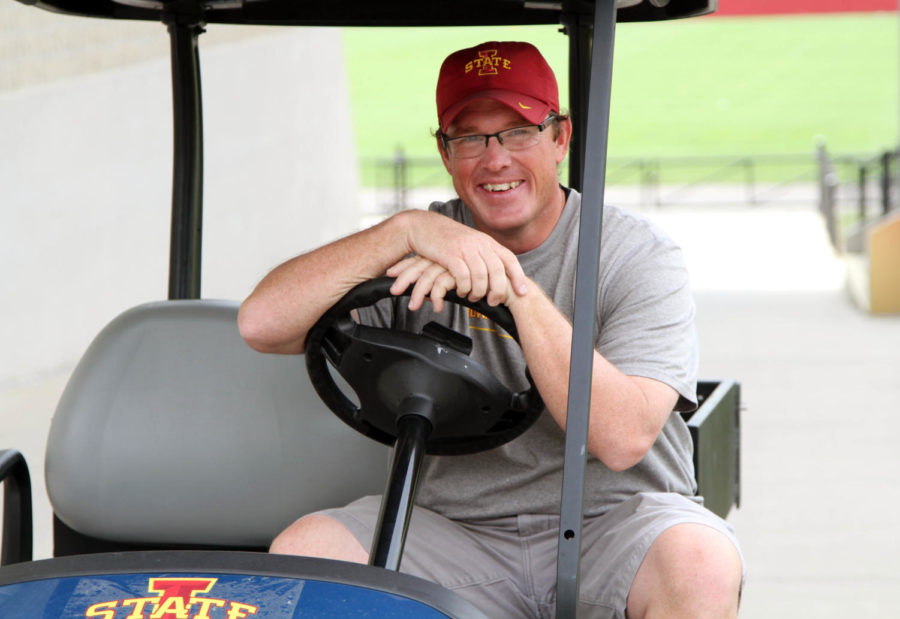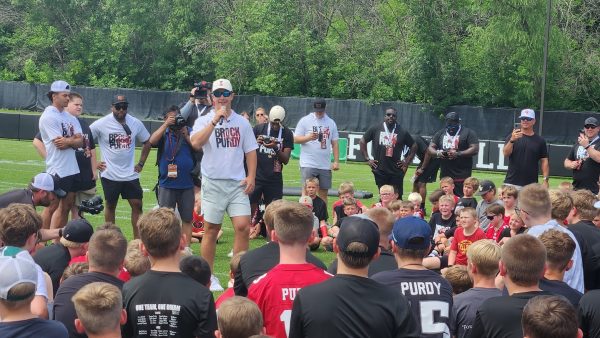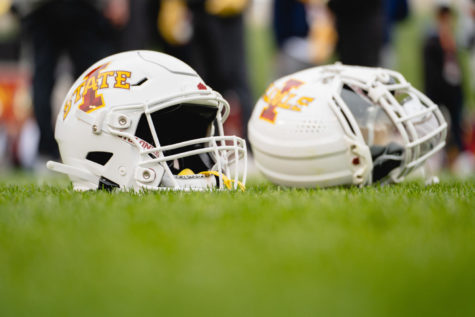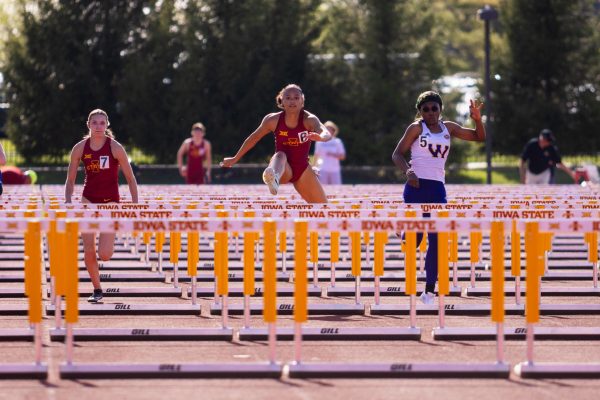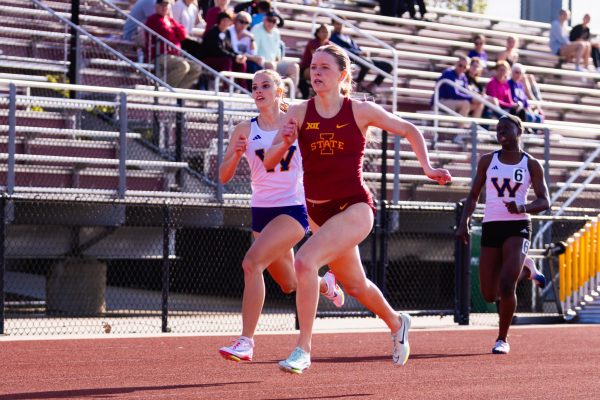Brian Honnold: Iowa State’s every-man behind game day
September 9, 2017
Drive past Jack Trice Stadium at 11 p.m. before an Iowa State football game day. The lots are completely empty — even the commuter lots — and the field is lit and ready.
In 10 hours, both areas will be swamped with Cyclone fans.
When tailgating-ready fans arrive early the next morning, they follow the waving hands and batons of staff standing in front of barricades. Fourth Street, where cars zoomed by slightly over the speed limit the night before, is closed. Tailgating packs engulf the area around the stadium and in the lots.
None of it was there the night before. So when did the barricades appear? When did the lots go from parking to party?
Most games, somewhere between 3 and 5 a.m., and it comes from the direction of one man: Brian Honnold, Iowa State’s director of game operations.
Honnold’s first job with athletics was with the equipment manager of the football team as an undergrad at Iowa State. But it wasn’t the job Honnold dreamed of having when he went to college. The young Honnold wanted to be a football coach, or a wrestling coach, just like his dad.
“The more you got involved, everybody wants to be a coach, so it’s like, let’s be a little more realistic,” Honnold said. “I’ve always liked working any event, just to see it all come together. I’ve always been a Cyclone fan. This is where I’ve always wanted to work.”
Honnold was back after grad school working in the event management department. He had a job managing wrestling, gymnastics and volleyball events. Then, on August 11, 2010, Hilton Coliseum flooded.
“I remember coming into work that day,” said Chris Jorgensen, senior associate athletics director for operations and Honnold’s supervisor. “You couldn’t even get to Hilton other than through the pedestrian bridges. I remember opening the doors, and it sounded like Niagara Falls with all the water below. You couldn’t see much, but you knew. It smelled like floodwater.”
Honnold’s supervisor at the time had to focus on getting Hilton back and ready for basketball season in less than 90 days, leaving football up in the air.
So Honnold stepped in. He’s been the man behind game day ever since.
Getting started
Seven years later, Honnold, with keys to a golf cart, the shoulders of a former wrestler and ballcap and glasses in place, does everything it takes to make game day happen, and he does it with a humble half-smile and no-nonsense eyes.
His gameday starts early. Honnold arrives at the stadium two hours before parking lots open. At Iowa State, they open at 7 a.m. or six hours before kickoff, whichever is earlier. For an 11 a.m. game, the parking lots open at 5 a.m. — and that means Honnold is on the job at 3 a.m.
“He wants to be there before everybody else gets there. In our positions, that’s standard,” said Seann DeMaris, a former classmate who works with Honnold. “You don’t get in the industry to work an 8 to 5 job. You’ve got to like what you do.”
Those signs telling people which items you can and can’t have in the stadium, and what they need to go in and out of the stadium, or where to turn?
Honnold.
Who do all those security personnel, ticket takers and traffic directors report to?
Honnold.
Who gets called when someone takes up three parking spaces, with their tent on one side of their truck and their cornhole game on the other?
Honnold.
“There’s a lot of things that fall under that category of ‘all other duties as assigned,’ and Brian takes that to heart,” Jorgensen said. “He’s not going to ask somebody to do something he’s not willing to do himself.”
Six and a half hours to kickoff (30 minutes until lots open): Standing at the north end zone, Honnold is joined byContemporary Services Corporation, a third-party security company. They base their operations out of a game day room, hidden most days by a garage door.
Custodians put out trash cans under Honnold’s supervision. He and his team of three to four people stay busy, taking two golf carts from task to task.
“A lot of the work Brian does is behind the scenes,” DeMaris said. “So many people are impacted by his work.”
DeMaris nominated Honnold for The Young Professionals of Ames 4 Under 40 awardin 2016. DeMaris had received the same award in 2013, and he knew he wanted to pay it forward somehow. The two had similar jobs in college and now work together on events coming to the community that use athletics’ facilities. For Honnold and Jorgensen, being unknown means they’re doing their job.
“If it goes without incident, then we’ve done our job. Our job’s not to make news,” Jorgensen said.
Six hours to kickoff: Lots are open. Bike racks are spread out. Honnold checks in with CSC. If something happens, they know to contact him and he’ll go with them to the site of the incident. Sometimes, it’s an unruly neighbor, an open flame or a keg. Usually it’s someone taking up too much space.
“The challenge of that role is you’re hosting 50,000 people on a game day who all have a unique expectation for what makes a great game day,” Jorgensen said.
DeMaris said Honnold is the same down-to-earth, easy-to-talk-to guy he was in college.
“He’s very flexible. It’s not, ‘No we can’t do that,’ it’s, ‘How can we make it work?’” DeMaris said. “He’s very straightforward, usually with a reason why. He’s not an intimidating guy.”
The heat is on
Three hours before kickoff: The officials arrive in an express shuttle bus. Honnold meets them in the parking lot, walking them to the locker room and prepping them for the game. Honnold is their liaison. Any electronics the officials wear or use on the field go through his hands.
“The toughest thing I deal with is not trusting others to do the job the way that I feel like it should be done,” Honnold said. “It doesn’t mean if someone were to do it it’s not done right, it’s just a different way. There’s always a different way. It’s tough for me, I come by that, honestly, from my parents.”
Honnold’s father was a wrestling coach, and the family would unroll wrestling mats and prepare the room before practice instead of asking janitors to do it. The Honnolds are helpers, but beyond that, when they see something that needs done, they just do it.
“Same thing for people who deal with me, I’m sure,” Honnold said. “[They say], ‘If Brian says he’s got it, he’s got it.’”
DeMaris nominated Honnold because he thought he was a key part of any event. Some say the events wouldn’t go on without him.
When asked, Honnold shrugged. “I don’t know about that; it would happen.”
Would it go differently?
“It sure would,” Honnold said with a half-smile.
Two and a half hours before kickoff: The Cyclones arrive at Jack Trice. Honnold meets the lead bus; Coach Matt Campbell’s security takes the front, Honnold takes the back.
“I’ll walk them into the locker room, give the security guys the heads up, and then I kinda leave them alone and try to stay out of Bergstrom as much as possible,” Honnold said. “Not really doing much, just making sure nothing goes haywire.”
Two hours before kickoff: The visiting team arrives. Honnold goes to meet the team with his intern and assistant, and all three accompany the team back to the locker room. Honnold checks with their football operations person, making sure the team has what it needs — towels, Gatorade, chairs in the locker room, even missing equipment.
Most days, Honnold can stay away from the locker rooms. But that wasn’t the case during the Iowa/Iowa State game in 2013. Someone had broken into the visiting locker room by pretending to be on the Iowa coaching staff.
“There was a guy who found out what polo the Iowa football coaches were wearing,” Honnold said. “He walked in with the rest of the coaches; no one from the Iowa staff was like ‘who’s this guy.’
“All hell broke loose,” Honnold said.
The thief stole several players’ phones and wallets. At the time no security cameras were in the locker rooms, just guards. There are now.
Honnold said witnesses mentioned a man bragging at the bars after the game. An arrest warrant was issued in December, but by then the man was long gone.
“He left the country,” Honnold said. “It was crazy.”
A stadium in wait
There are more calm days than exciting ones. Honnold usually sees the stadium empty. Standing in the President’s Suite, the field looks far away, in miniature. Standing on the field, the seats seem to rise to the sky.
But even when it’s empty, the stadium still holds a feeling of anticipation, as if the four decades of games and screaming fans had absorbed into the actual bones of the stadium.
Ninety minutes before kickoff: The officials meet with each coach and gates open.
“It’s kinda cool seeing [the stadium] empty, and then on game day you fill it up with 50,000 people. It’s pretty sweet,” Honnold said.
Forty minutes before kickoff: Time to test the ref’s microphone.
Twenty minutes before kickoff: The teams leave the field and return to their locker rooms.
Five minutes before kickoff: The pump-up video declares a Cyclone warning.
Game on
Kickoff: Honnold moves to the field. It is eight hours after his arrival.
Honnold takes a spot in a north corner. Both teams know where to find him. From there he’s the on-field connection for anyone in the press box, including the police, stadium operators, paramedics and security.
“As much as people wanna say it doesn’t happen because of me, it doesn’t happen because of anybody,” Honnold said. “If we didn’t all come together, it wouldn’t happen.”
For those up in the press box, Honnold isn’t their boss— but he is their lifeline.
“Football days are just constantly putting out fires,” Honnold said.
He meant it metaphorically, of course. Honnold is called when a phone is dropped in a toilet, a couple is caught having sex, or old athletes try to get back on the field, just to name a few. Honnold is responsible for the whole event, from 3 a.m. until the final car leaves the lot and the stadium is closed for the night.
“It all comes back to me,” Honnold said. “The more in the background I am, the better off everything’s going inside the stadium.
“We set up the playground,” he said. “They’re the ones who go out and get the attention.”

